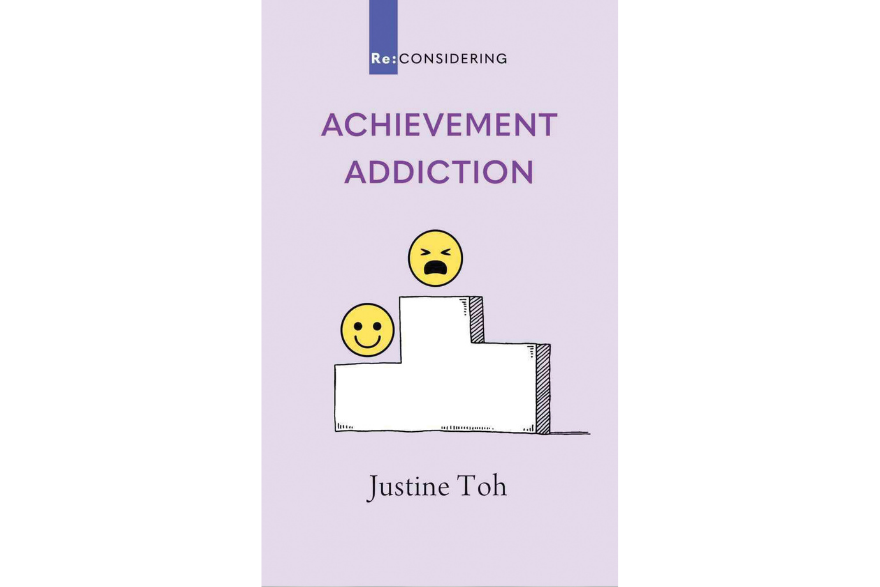Book Review – Achievement Addiction

Justine Toh’s Achievement Addiction diagnoses some of the pathologies of achievement: the ways something healthy and good—like getting things done in a timely and competent manner—can go wrong.
When a rewarding activity becomes compulsive we call it addiction. Even when the activity is a good thing in itself, addiction twists it into a ‘substitute god’ we’re willing to sacrifice everything else for (p3). It becomes what drives our decisions, the thing we make everything else work around. Toh points out that ‘achieving’ slots readily into this pattern. It gives us a buzz of self-satisfaction—I did that!—and even more so when it attracts praise from others. But the buzz fades and we need to achieve again to recapture the high.
The impact of this addiction is exacerbated when our self-worth and identity become entwined with our achievements—what Toh calls workism: ‘the pursuit of ultimate meaning and satisfaction through achievement’ (p51). With this mindset, failure to achieve ‘can be soul-destroying because your reason for existence has judged you and found you wanting’ (p52).
A self-acknowledged achievement addict herself, Toh comes from the stereotypical ‘high-achievement-oriented Asian background’, and is well aware of these dangers. But the malady is not restricted to any particular subculture. We are immersed in a meritocracy that values people according to their achievements (as opposed to their pedigree, status, or wealth). The number of ways society provides us with to quantify and compare our value are mind-boggling—from NAPLAN, ATARs, and performance reviews, to how many steps walked, how many hours worked, how much we’re paid, and how many people liked our latest post. It’s hardly surprising that many of us are addicted to achievement: ‘If you treat people as though they’re the sum of their achievements, prepare for them to strive endlessly, suffer along the way, and be smug when they prosper’ (p10).
Toh’s discussions of striving, suffering, and smugness are entertaining and engaging, with generous doses of self-disclosure and pop culture (Hamilton, West Wing, Harry Potter, Reality TV, Hunger Games, and Amy Chua’s Tiger Mother, to name but a few). As I read, I couldn’t help wondering what kind of recovery schedule Toh would offer her fellow addicts. To stave off drug or gambling addictions, one might recommend avoidance, or the substitution of less damaging alternatives. But hard work, perseverance, and doing things well—these are qualities we want in ourselves, and seek to cultivate in our children. What would she propose in their stead? Laziness? Giving up? Being slap-dash? Overthrowing the meritocracy?
None of these is among the answers Toh proposes. Well, perhaps overthrowing the meritocracy a little—but not to replace it with another ‘ocracy’ that divides society’s haves and have-nots on different criteria; rather to overthrow it in our own thinking. She sees a better way in the teaching and actions of Jesus and Paul. Grace upends the notion of everyone getting what they deserve (and no more!), and shifts the focus to generosity and mercy. A community of people who generously love and belong to one another won’t see their individual achievements as a means of competing for rewards, but of contributing to the good of the community. And seeing the achievements of others contributing to our own good can engender gratitude rather than competition, acknowledging interdependence and sidestepping pride. These revolutions—grace, service, humility, thankfulness— undermine the meritocratic temptation to align worth with achievement.
It’s a deeply satisfying answer. The beauty of Toh’s reframing of achievement is that it allows us to recognise and rejoice in the goodness of doing things well, while protecting us against its pathologies. The purpose of achieving shifts from serving self, to serving others.
Achievement Addiction is an easy read, but not a trite one. There are insights aplenty, and Toh’s text readily sparks further questions: Is it unchristian to pursue achievements to an elite level? Is competition always unhealthy? When should we praise someone’s achievements? What achievements are worth achieving? These cannot all be addressed in such a short book, but in encouraging us to think about the issues, and consider the health of our own attitudes to achievement (without ever being preachy), this book is well worth the read!
Leave a comment
Comments will be approved before showing up.



